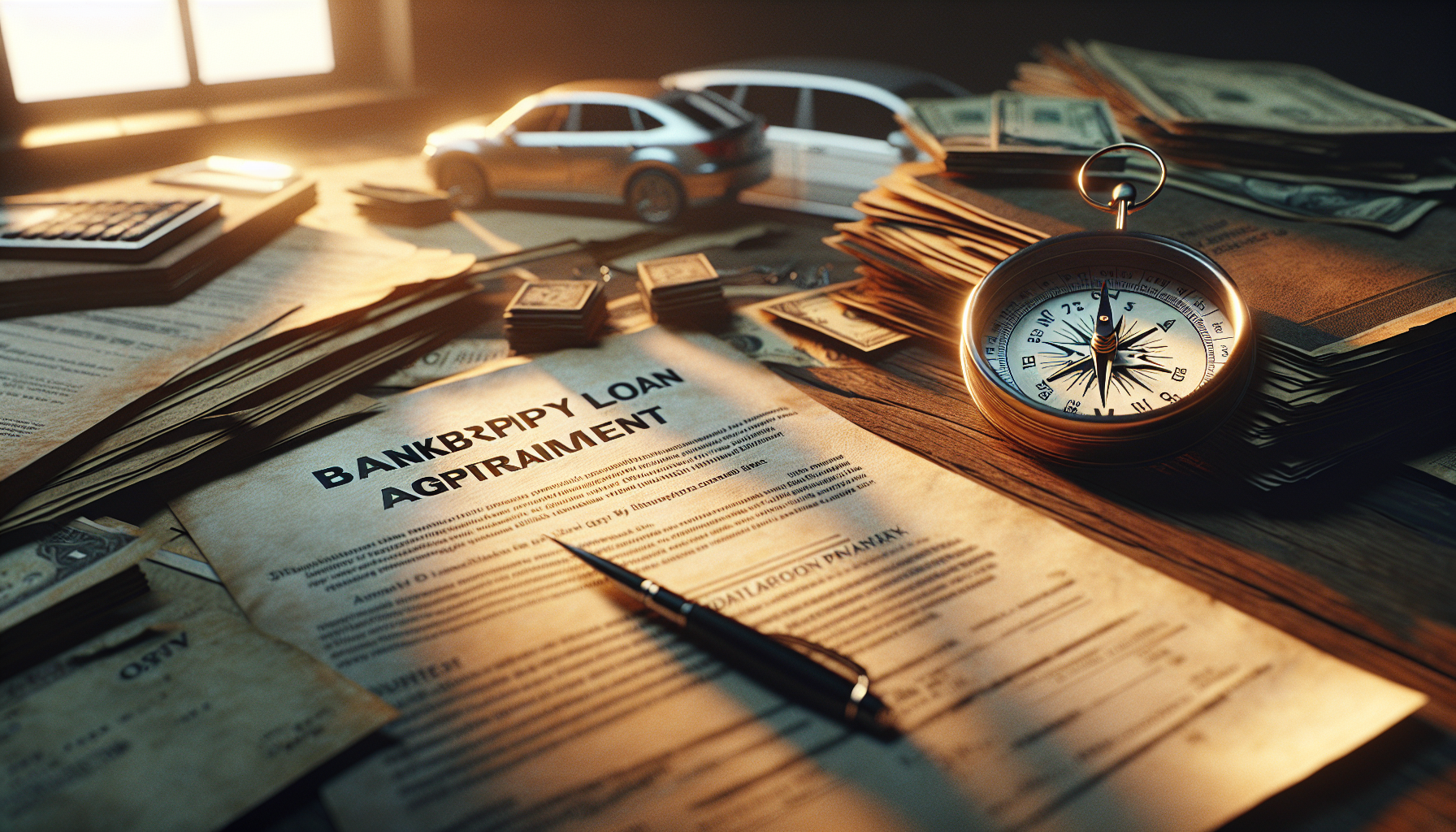
Facing financial distress can hinder your ability to secure an auto loan default, as lenders often scrutinize your credit rating. Nonetheless, insolvency and vehicle financing can coexist, it’s not a door closing on your chances.
Conquering financial upheavals, while securing an auto loan is indeed achievable.
Consider John’s situation; despite grappling with Chapter implications, he successfully navigated through and secured his car loan.
The key to his success? Repossession avoidance, coupled with his relentless efforts to improve his payment records. These strategies had a significant positive impact on his credit rating, a vital step for anyone looking to secure auto financing post-financial turmoil.
If you find yourself in a similar predicament, don’t lose hope. Multiple factors such as auto loan default, insolvency and vehicle financing, repossession avoidance, credit rating, chapter implications, and chapter consequences can significantly influence your financial stability.
Understanding Auto Loan Default and Bankruptcy
Bankruptcy intricately intersects with auto financing, leading to financial distress that often necessitates debt restructuring. This process significantly influences numerous facets of an individual’s life and specifically impacts automobile financing.
Gaining a comprehensive understanding of the legalities, specifically auto lending bankruptcy laws associated with bankruptcy and auto loans, becomes imperative.
Post-bankruptcy, procuring vehicle financing may turn into an uphill battle.
Subprime auto loans could present a viable solution for some. Identifying and exploring potential avenues for securing vehicle credit is fundamentally essential towards restoring financial stability.
Proper management of a car loan, particularly in times of financial distress, plays a pivotal role in credit score restoration. This is where secured car finance can prove to be a valuable tool, specifically designed for credit improvement.
During a bankruptcy period, procuring automobile financing necessitates careful consideration. Mastering the intricate process of managing subprime auto loans, secured car finance, and vehicle liens can significantly aid in navigating debt restructuring, especially during times of financial distress and comprehending the complex auto lending bankruptcy laws.

Repossession Avoidance What Are Your Options
Repossession poses a significant risk to borrowers who cannot honor their financial responsibilities, a process also known as ‘credit recovery’. This process is primarily a lender’s strategy for reclaiming their investments when a borrower repeatedly misses payments or defaults entirely.
Among the most frequent objects seized are cars.
Reasons for a car’s repossession vary, ranging from defaulted payments to contract term violations.
One should not overlook the subsequent impact of repossession on your credit score, as it is a major factor contributing to ‘vehicle refinance after insolvency’. Repossession can trigger a considerable decrease in your score and delay your credit recovery efforts.
A repossession record can linger on your credit report for up to seven years, further exacerbating your financial predicament.
There are several strategies, nonetheless, geared towards averting vehicle repossession or ‘car loan lenders’. Maintaining an open line of communication with credit recovery agencies, vehicle refinance companies after insolvency, car loan lenders, discharge of debt organizations, reaffirmation agreement parties, and personal insolvency advisers is vital.
| Repossession Impact | Strategies to Avert Repossession |
|---|---|
| Significant decrease in credit score | Maintain open communication with credit recovery agencies |
| Repossession record can remain on credit report for up to seven years | Engage with vehicle refinance companies after insolvency |
| Contributes to difficulties in vehicle refinance after insolvency | Seek advice from personal insolvency advisers |
How Does Bankruptcy Affect Your Credit Rating
Bankruptcy, a legal process designed to help individuals grappling with severe financial hardship, allows them to eliminate or repay their debts within a federally protected environment. An alternative solution might be debt consolidation, which could be more suitable based on the individual’s financial situation.
Nonetheless, understanding the impact of bankruptcy on your credit rating is paramount.
Your credit rating is a critical measure of your creditworthiness, influenced by your past credit history.
A bankruptcy filing is considered a negative entry on your credit report, which directly impacts your credit rating. This critical information is recorded in the public record section of your report and can affect your car loan interest rates among other financial implications.
The duration bankruptcy stays on your credit report varies according to the bankruptcy type and could influence your loan repayment strategies
Chapter Implications on Secured Car Finance
Bankruptcy can notably affect secured car finance, particularly when involving Chapter 7 and Chapter 13 legal proceedings. The car ownership options may dramatically alter due to intensified creditor claims.
In secured car loans, compared to unsecured car finance, the tangible asset, i. e. , the vehicle, might be seized if defaults occur.
Chapter 7, frequently referred to as a liquidation bankruptcy, may significantly increase the repossession risk on your vehicle.
It implies that the creditor claims could lead to potential loss of your vehicle. This process differs sharply from the unsecured car finance scenario where there is no risk of tangible asset seizure.
Meanwhile, Chapter 13 offers a route for auto finance restructuring. It provides a much-needed respite for dealing with financial crisis situations.
Namely, it allows the negotiation of a loan modification. This modification could potentially reduce your monthly payments, thus enabling more flexible car ownership options, lowering repossession risk due to unsecured car finance, and facilitating auto finance restructuring and loan modification against creditor claims.
Key Points About Bankruptcy Impact on Secured Car Finance
- Secured car finance is notably affected by bankruptcy, especially under Chapter 7 and Chapter 13 legal proceedings.
- Chapter 7 bankruptcy, also known as liquidation bankruptcy, may significantly increase the risk of vehicle repossession due to creditor claims.
- Chapter 13 bankruptcy provides a route for auto finance restructuring, which can offer relief in financial crisis situations.
- Through Chapter 13, a loan modification can be negotiated, potentially reducing monthly payments and lowering repossession risk.
Debt Restructuring A Lifeline in Financial Distress
In the face of financial hardship, where an individual or organization is struggling to meet debtor obligations such as loan repayments, the significance of debt restructuring as a financial solution often becomes a lifeline, staving off bankruptcy. Credit counseling is instrumental in understanding the predicament better and forming a plan of action.
The connection between financial distress and bankruptcy is far from subtle.
When meeting debtor obligations becomes a hurdle, the likely outcome is bankruptcy.
Such a state of insolvency deeply impacts personal finances, notably situations involving underwater auto loans. A prime example of the financial toll is when defaulting on auto loans results in a vehicle auction, leaving one without transportation.
Acquiring an auto loan amidst financial turmoil becomes a daunting task, filled with legal filings and other formalities. The implementation of a meticulously planned debt restructuring scheme can turn the tables. It may involve negotiating an extension on debtor obligations, such as underwater auto loans, a process which could require credit counseling, debt settlement strategies, vehicle auctions, and legal filings.
Legal Proceedings in Auto Lending Bankruptcy Laws
Understanding the intricate mechanics of legal proceedings in auto lending bankruptcy laws requires comprehensive knowledge of crucial terms and procedures. Bankruptcy represents a legal process wherein individuals or businesses unable to fulfill their debt obligations seek legal exemptions, a strategy employed to safeguard some of their assets.
Auto loans, a manifestation of secured debt, intertwine closely with bankruptcy laws.
Filing for bankruptcy often has a substantial credit score impact, affecting future borrowing capabilities, including home equity impact, which can influence potential refinancing options.
Fascinatingly, the notion of automatic stay plays an influential role amid these proceedings. This legal provision temporarily restrains creditors from further debt collection efforts, giving debtors a breather.
Loan arrears, overdue payments, can disrupt this temporary relief, bringing forth further complications. Despite the daunting bankruptcy proceedings, various alternatives exist for debtors such as considering legal exemptions, understanding home equity impact, exploring post-insolvency car financing options, studying credit score impact, managing loan arrears, and reviewing car title loan implications.
Auto Lending Bankruptcy Laws
- Bankruptcy is a legal process where individuals or businesses unable to fulfill their debt obligations seek legal exemptions to protect some of their assets.
- Auto loans are a form of secured debt and are closely linked with bankruptcy laws. Filing for bankruptcy can significantly impact credit scores and future borrowing capabilities.
- The concept of automatic stay is a legal provision that temporarily prevents creditors from further debt collection efforts, providing a temporary relief to debtors.
- Despite the complex nature of bankruptcy proceedings, debtors have various alternatives such as understanding home equity impact, exploring post-insolvency car financing options, studying credit score impact, managing loan arrears, and reviewing car title loan implications.
Navigating Car Loan Interest Rates Post Bankruptcy
Bankruptcy is undeniably a daunting legal proceeding, but understanding it and its impact on your credit score can help in navigating car loans post bankruptcy. It is essentially a legal action that permits individuals or businesses to clear their debts, usually due to insolvency.
Insolvency law governs these proceedings, causing significant impact on one’s credit ratings.
This financial situation can lead to difficulties in obtaining future financing.
Lenders often perceive individuals with past bankruptcy as high-risk. Consequently, this perception affects the auto loan terms and conditions offered to them, including the interest rates.
Bankruptcy also influences the borrower’s eligibility for car loans, with some lenders reluctant to extend credit to such borrowers.
Nevertheless, rebuilding your financial standing post bankruptcy isn’t impossible.
Availing auto loans can be one of the practical steps towards this goal. While they may come with higher interest rates, auto loans can lead to legal proceedings and insolvency law implications, especially with past due car loan situations, making it important to fully understand the auto loan terms and conditions, trustee roles, and leasing considerations.
The Impact of Personal Insolvency on Car Ownership Options
Personal insolvency dramatically impacts an individual’s capacity to manage their car assets, influencing their financial protection. The process commences with the complicated aspects of filing for personal insolvency, including understanding different bankruptcy chapters, their implications, and the need for legal representation.
As the insolvency proceedings advance, the fate of existing automotive assets is put under the microscope.
In the face of financial ruin, the chance to retain one’s vehicle provides a glimmer of hope.
The looming threat of vehicle repossession puts stability of car ownership at severe risk.
The journey of car ownership doesn’t get easier post-bankruptcy.
Arranging repayment plans becomes a high-priority task, with maintaining and managing existing assets paramount. Successful car loan negotiation becomes an uphill battle, as sourcing automotive financing transforms into a more challenging endeavor. Re-establishing financial stability post-insolvency often hinges on one’s financial protection, repayment plans, avoidance of financial ruin, car loan negotiation skills, legal representation, and strategies to prevent vehicle repossession.
Personal Insolvency and Car Ownership
- Personal insolvency significantly affects an individual’s ability to manage their car assets, impacting their financial security.
- During insolvency proceedings, the ownership status of automotive assets is closely examined, potentially leading to vehicle repossession.
- Post-bankruptcy, arranging repayment plans and managing existing assets become critical tasks, with car loan negotiation becoming particularly challenging.
- Re-establishing financial stability after insolvency often depends on factors such as financial protection, avoidance of financial ruin, negotiation skills, legal representation, and strategies to prevent vehicle repossession.

Get a Free Bankruptcy Case Evaluation